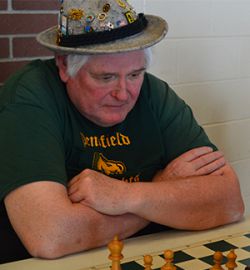Research has shown students who play chess do well at several things. They are better problem-solvers; have improved concentration and memory; higher spatial reasoning, reading and math skills; and increased logic, creativity and strategic planning.
That’s part of the reason why Curt Wissink, a Page Elementary fifth-grade teacher, puts on the West Michigan Chess Tournament every year. The competition brought nearly 140 students in grades K-8 together at Thornapple Kellogg Middle School recently.
Studies have shown chess can benefit students in many ways, including:
|
“It’s a game about strategy,” said Paige Green, a sixth-grader at the middle school who was marking her third time at the tournament. “It works your brain to the limit.”
Wissink said the popularity of chess soared when American Bobby Fischer won the World Championship in 1972, but the interest faded. In the last several years, it’s been growing.
“It’s neat getting kids interested in chess again,” Wissink said. “We are so far behind. A lot of countries require it to be taught.”
Seven rows of white banquet tables topped with chess sets ready for matches filled the large room where the contest took place. After students found their places, the initial round started with opponents shaking hands and parents taking pictures. The room then went silent except for the clumping sounds of chess pieces being moved.
Friends and family circled the room, but there was no clapping, cheering or parents yelling “helpful” advice as the games proceeded — just lots of breath-holding and neck-craning as they watched for next moves.
Kent ISD students from Byron Center, Grandville, Lowell and East Grand Rapids were among those who attended. Several students from other West Michigan districts and home-schoolers also played.
Wissink’s wife, Kelly, said her family looks forward to the event every year. “I love to see parents and kids turn out for a non-athletic and academic event, where they’re celebrated and having fun,” she said.
Jacob Kadrovach, a Thornapple Kellogg middle school student, has been playing chess for a couple of years.
“It’s fun, and I get to learn,” Jacob said. “It’s very relaxing.” Last year his mom, Laura Sanford, said she had to “take it easy” on him when they played chess. This year, he has to take it easy playing her, she said.

Focus, Critical Thinking, Manners
The tournament was a family affair for Thornapple Kellogg seventh-grader C.J. Crabtree. His mom, Molly Crabtree, grandma Rusty Dowling and uncle Gary Brown all came to watch.
C.J. said he likes the competition that comes with chess, and that it helps him focus. His mom agreed it had helped his concentration, She also likes the game because it teaches sportsmanship and manners.
Grandma, too, was supportive. “It helps develop their critical thinking skills and patience,” she said. “They plan their moves and see what the outcome is going to be.”
Brown, who played practice games with his nephew between rounds, said he used to be able to beat C.J., “but then he got those doggone coaches. I do two moves ahead, and he does about four.”
Those “doggone coaches” include tournament organizer Wissink, whose fourth- and fifth-grade chess club this year has 80 players. He started a school-wide tournament 14 years ago, in 1999.

Wissink doesn’t just play chess for pleasure; he also uses it to teach subjects in his classroom (see box for how students can benefit from playing chess).
“He relates well to the kids and focuses on getting them to think on their own,” said Laura Sanford, mother of Jacob Kadrovach.
Enthusiastic tournament organizers and volunteers ran the show. It was a good time for them, judging by their laughter and smiles when there were breaks. The sight of all the students playing chess made them proud.
Said co-organizer Dirk Van Diver, vice principal at Pennfield Dunlap Elementary in Battle Creek, “I can’t say how excited I am to see 140 kids playing chess on a Saturday morning.”
CONNECT
The Benefits of Incorporating Chess in the School Curriculum









